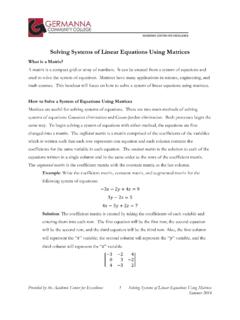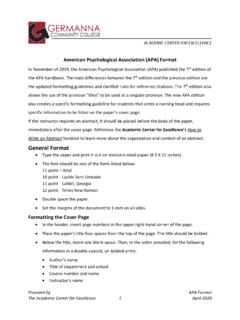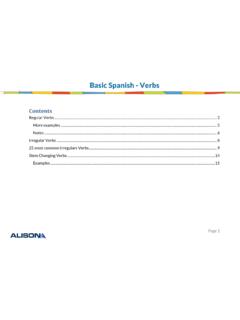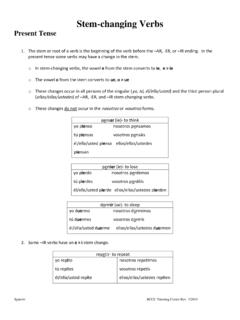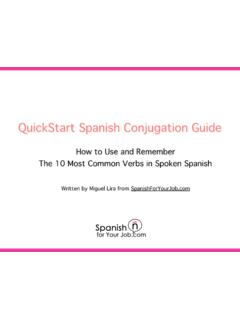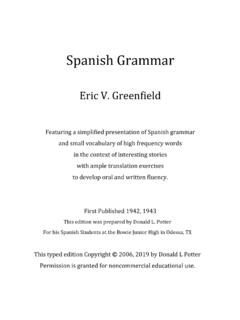Transcription of Spanish Verbs - Online Community College
1 Guide to Spanish verb TensesGuide to Spanish verb TensesAcademic Center for ExcellenceFredericksburg Area Campus: (540) 891-3017 | Locust Grove Campus: (540) 423-9148 February 2018 HolaHolaHolaGuide to Spanish verb TensesFebruary 2018 February 2018231 NotesProvided by the Academic Center for ExcellenceGuide to Spanish verb TensesFebruary 2018 February 2018303 NotesConjugation Beginner s Reference How to Conjugate Regular Spanish Verbs Present Tense Present Progressive Preterite Imperfect Formal Commands Present Subjunctive Affirmative Informal Commands Negative Informal Commands Future TenseConditional Present PerfectPast Perfect Imperfect Subjunctive Present Perfect SubjunctiveConditional
2 Perfect Pluperfect Subjunctive 4567101114151619192021222324272728 Table of ContentProvided by the Academic Center for ExcellenceGuide to Spanish verb TensesFebruary 2018 February 2018429 NotesConjugation is the process of changing a verb to agree with a subject, so the verb reflects who or what is doing the action. In addition, the verb s conjugation will show when the action occurred: the present, the past, the future, Verbs consist of two parts: the stem and the ending. Together, the stem and the ending are referred to as the infinitive.
3 When conjugat-ing a verb , the stem will remain while the ending will change. In span -ish, there are three endings: -ar, -er, and -ir. For example, in the infinitive hablar (to talk), the stem is habl- and the ending is -ar. Most Verbs are conjugated by taking the ending off of the infinitive and adjusting the verb s ending to agree with the subject (see page 6 for further practice). However, there are some irregular Verbs that do not follow these conjugations, such as ser, o r, and hacer. Therefore, this booklet also contains a list of common irregular Verbs with each verb by the Academic Center for ExcellenceGuide to Spanish verb TensesFebruary 2018 February 2018285 Beginner s Reference yoIFirst Person(Singular)t youSecond Person(Singular)(Informal)First person (Plural)Third Person (Plural)(Informal)Third Person(Plural)(Formal)hesheyou (Formal)Third Person(Singular)(Formal)weyou all (Informal)they (Masculine)they (Feminine)you all (Formal) l ellaUsted (Ud.)
4 Nosotrosvosotrosellos ellasUstedes (Uds.)Pluperfect Subjunctiveyot l/ella/Ud. nosotros vosotrosellos/ hubiera hubi ramos hubieraishubieran-ado (-AR Verbs )+-ido (-ER/-IR Verbs )Examples:Yo dudaba que t hubieras doubted that you had/would have esper bamos que ellos hubieran were hoping that they had/would have by the Academic Center for ExcellenceGuide to Spanish verb TensesFebruary 2018 February 2018627 How to Conjugate Regular Spanish VerbsFollow these three steps to conjugate a regular verb :1. Locate and remove the ending of the Choose the correct conjugation for the person, object, or thing doingthe Add the conjugation to the s practice on comer (to eat) and conjugate it to say I eat :1.
5 The ending of comer is -er, so the ending is removed, leaving only thestem, The correct conjugation for yo (I) is -o (see present tense ER charton page 7).3. -o is added to com- to create the conjugated verb , s try one more, vivir (to live), and conjugate it to say We live. Vivir Viv-2. -imos (see present tense IR verb chart on page 7) + imos = VivimosPresent Perfect SubjunctiveConditional Perfectyot l/ella/Ud. nosotros vosotrosellos/ ishayan-ado (-AR Verbs )+-ido (-ER/-IR Verbs )yot l/ella/Ud. nosotros vosotrosellos/ ahabr ashabr ahabr amoshabr aishabr an-ado (-AR Verbs )+-ido (-ER/-IR Verbs )Examples:Yo espero que t hayas hablado.
6 Es imposible que l haya hope that you have is impossible that he has : Ella habr a hablado. Ellos habr an would have would have by the Academic Center for ExcellenceGuide to Spanish verb TensesFebruary 2018 February 2018726 Imperfect Subjunctive: Common Irregular VerbsPensar (to think) - pensara, pensaras, pensara, pens ramos, pensarais,pensaranPoder (can, to be able to) - pudiera, pudieras, pudiera, pudi ramos, pudierais, pudieranPoner (to put, to turn on TV/radio) - pusiera, pusieras, pusiera, pu-si ramos, pusierais, pusieranPreferir (to prefer) - prefiriera, prefirieras, prefiriera, prefiri ramos, prefirierais, prefirieranProducir (to produce) - produjera, produjeras, produjera, produj ra-mos,produjerais, produjeranQuerer (to want)
7 - quisiera, quisieras, quisiera, quisi ramos, quisierais, quisieranRecoger (to pick up) - recogiera, recogieras, recogiera, recogi ramos, recogierais, recogieranRecordar (to remember) - recordara, recordaras, recordara, record ra-mos, recordarais, recordaranSaber (to know, to know how) - supiera, supieras, supiera, supi ramos,supierais, supieranSacar (to get, to take out) - sacara, sacaras, sacara, sac ramos, sacarais, sacaranSalir (to leave, to go out) - saliera, salieras, saliera, sali ramos, salierais, salieranSeguir (to follow, to continue) - siguiera, siguieras, siguiera, sigui ra-mos, siguierais, siguieranSentir (to feel sorry) - sintiera, sintieras, sintiera, sinti ramos, sintierais,sintieranTener (to have) - tuviera, tuvieras, tuviera, tuvi ramos, tuvierais, tuvier-anTraer (to bring) - trajera, trajeras, trajera, traj ramos, trajerais, trajeranVenir (to come) - viniera, vinieras, viniera, vini ramos, vinierais, vinier-an Ver (to see)
8 - viera, vieras, viera, vi ramos, vierais, vieranyot l/ella/Ud. nosotros vosotrosellos/ is-anyot l/ella/Ud. nosotros vosotrosellos/ is-en-AR-ERPresent Textyot l/ella/Ud. nosotros vosotrosellos/ s-en-IRExamples:Nosotros hablamos. T comes. We by the Academic Center for ExcellenceGuide to Spanish verb TensesFebruary 2018 February 2018825 Present Tense: Common Irregular VerbsIrregular in yo formDar (to give, to hand) - doy, das, da, damos, dais, dan Estar (to be) - estoy, est s, est , estamos, est is, est n Ir (to go) - voy, vas, va, vamos, vais, vanSaber (to know, to know how) - s , sabes, sabe, sabemos, sab is, sabenSer (to be) - soy, eres, es, somos, sois, sonVer (to see) - veo, ves, ve, vemos, v is, ven Go VerbsHacer (to do, to make) - hago, haces, hace, hacemos, hac is, hacenO r (to hear) - oigo, oyes, oye, o mos, o s, oyenPoner (to put, to turn on TV/radio)
9 - pongo, pones, pone, ponemos, pon is, ponenSalir (to leave, to go out) - salgo, sales, sale, salimos, sal s, salen Tener (to have) - tengo, tienes, tiene, tenemos, ten is, tienen Traer (to bring) - traigo, traes, trae, traemos, tra is, traenVenir (to come) - vengo, vienes, viene, venimos, ven s, vienen e-ie stem changersDespertarse (to wake up) - me despierto, te despiertas, se despierta, nos despertamos, os despert is, se despiertanPensar (to think) - pienso, piensas, piensa, pensamos, pens is, piensanPreferir (to prefer) - prefiero, prefieres, prefiere, preferimos, prefer s, pre- fierenQuerer (to want) - quiero, quieres, quiere, queremos, quer is, quierenSentarse (to sit down) - me siento, te sientas, se sienta, nos sentamos, osImperfect Subjunctive.
10 Common Irregular Verbs Empezar (to begin, to start) - empezara, empezaras, empezara, em-pez ramos, empezarais, empezaranEntender (to understand) - entendiera, entendieras, entendiera, en-tendi ramos, entendierais, entendieranEscoger (to choose) - escogiera, escogieras, escogiera, escogi ramos, escogierais, escogieranEstar (to be) - estuviera, estuvieras, estuviera, estuvi ramos, estuvierais,estuvieranHacer (to do, to make) - hiciera, hicieras, hiciera, hici ramos, hicierais, hicieranIncluir (to include, to enclose) - incluyera, incluyeras, incluyera, in-cluy ramos, incluyerais, incluyeranIntroducir (to introduce) - introdujera, introdujeras, introdujera, intro-duj ramos, introdujerais, introdujeranIr (to go)/Ser (to be) - fuera, fueras, fuera, fu ramos, fuerais, fueranJugar (to play a game/sport) - jugara, jugaras, jugara, jug ramos, jugarais, jugaranLeer (to read) - leyera, leyeras, leyera, ley ramos, leyerais, leyeran Mantener (to maintain) - mantuviera, mantuvieras, mantuviera, man-tuvi ramos, mantuvierais, mantuvieranMorir (to die)
